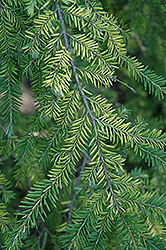Fri & Sat 8am - 8pm
Sun 8am - 7pm
Anytown, USA 12345
fax: 261.787.0463
e-mail: info@successgc.com


Plant Finder

Golden Splendor Hemlock
Tsuga canadensis 'Golden Splendor'
Height: 40 feet
Spread: 30 feet
Sunlight:
![]()
![]()
Hardiness Zone: 4a
Other Names: Canadian Hemlock, Eastern Hemlock
Description:
A stunning variety of hemlock, with soft golden needles and an open habit; very fast growing, upright and broadly conical; it can also makes a great hedge when pruned; needs adequate moisture, rich, acidic and organic soils and shelter from drying winds
Ornamental Features
Golden Splendor Hemlock is primarily valued in the landscape for its distinctively pyramidal habit of growth. It has attractive gold evergreen foliage. The needles are highly ornamental and remain gold throughout the winter.
Landscape Attributes
Golden Splendor Hemlock is an evergreen tree with a strong central leader and a distinctive and refined pyramidal form. It lends an extremely fine and delicate texture to the landscape composition which can make it a great accent feature on this basis alone.
This tree will require occasional maintenance and upkeep, and is best pruned in late winter once the threat of extreme cold has passed. Gardeners should be aware of the following characteristic(s) that may warrant special consideration;
- Insects
Golden Splendor Hemlock is recommended for the following landscape applications;
- Accent
- Vertical Accent
- Hedges/Screening
Planting & Growing
Golden Splendor Hemlock will grow to be about 40 feet tall at maturity, with a spread of 30 feet. It has a low canopy with a typical clearance of 3 feet from the ground, and should not be planted underneath power lines. It grows at a fast rate, and under ideal conditions can be expected to live for 70 years or more.
This tree does best in full sun to partial shade. It does best in average to evenly moist conditions, but will not tolerate standing water. It is not particular as to soil type, but has a definite preference for acidic soils. It is quite intolerant of urban pollution, therefore inner city or urban streetside plantings are best avoided, and will benefit from being planted in a relatively sheltered location. Consider applying a thick mulch around the root zone in winter to protect it in exposed locations or colder microclimates. This is a selection of a native North American species.
